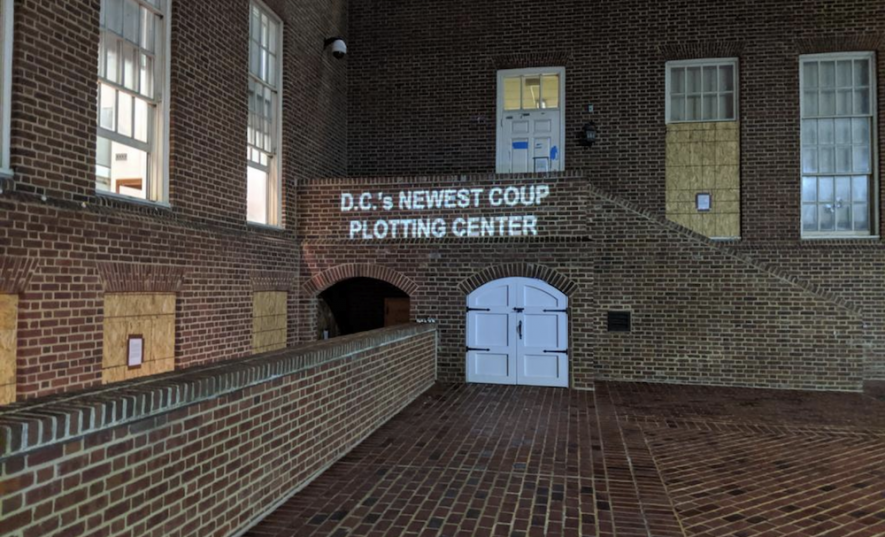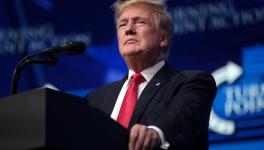Embassy Protection Collective Continues to Struggle Despite Eviction

On May 26, the Embassy Protection Collective activists projected protest messages on the outer walls of the Venezuelan embassy building. “D.C.’s newest coup plotting center… this is not an embassy… Vecchio can’t issue visas,” the messages said, referring to the newly recognized ‘ambassador’, Carlos Vecchio who represents the rebel United States-supported opposition.
The projections pointed out the illegitimacy of the people who now occupy the building that previously housed the main diplomatic mission of the Venezuelan government, since the new occupants cannot undertake any of the primary functions of an embassy like issuing visas, facilitating trade between the two nations or any other cultural or commercial exchange.
Secret Service kicked the activists out of the court yard, saying it was Venezuelan property. I grilled him on it, as did @JasonRCharter, but he just deferred to the State Department and said it was above his pay grade pic.twitter.com/qpiq5iFLj5
— Alex Rubinstein (@RealAlexRubi) May 26, 2019
Shortly after projecting the images, US Secret Service agents kicked activists out of the courtyard, despite it being the same area where opposition activists had installed themselves in their vicious campaign to attack the Embassy Protection Collective.
Their protest which came days after the embassy takeover by representatives of the far-right Venezuelan opposition – with the aid of the United States government- demonstrated that the struggle to protect the embassy is not over yet.
The Collective, a coalition of anti-war activists led by Code Pink, Answer Coalition and Popular Resistance, has reiterated its stand against the interventionist and imperialist policies towards Venezuela. After having evicted the activists who had occupied the embassy for more than a month, the US security forces installed the Guaido faction’s handpicked ‘ambassador’, Carlos Vecchio, on May 24.
In Washington D.C., the previous embassy staff representing the constitutional government of Venezuela, led by president Nicolas Maduro, had invited the Collective to keep a 24-hour vigil against any takeover by Guaido faction loyalists. The members began the occupation on April 10 and at the peak of the struggle, had more than 50 activists occupying the building. Their vigil was both in protest of the US interventionist policy in Venezuela as well to safeguard the embassy from a potential take over.
After Juan Guaidó gained support from the US and its Latin American allies for his self-proclaimed presidency, he designated ‘diplomatic representatives’ to carry out his lobbying work in several of these countries. In Costa Rica, the Guaidó appointed ‘diplomatic mission’ took over the Venezuelan embassy in San José.
After the Venezuelan embassy staff was forced to leave the US and their diplomatic post in Washington D.C., the attacks from the right-wing on the embassy installation increased, but the Collective reiterated its resolve to continue protecting the embassy. Pro-Guaidó supporters essentially imposed a barricade around the embassy and physically prevented Collective members from entering the building with crucial supplies like food and medicine. Their blockade was supported by the D.C. police and US secret service who arrested all who tried to pass food and other supplies to those inside the embassy. Ariel Gold, of CODEPINK, was arrested and charged with “throwing missiles” after throwing loaves of bread onto the balcony of the embassy. The authorities also cut off water and electricity supply.
On May 16, the police arrested the remaining four protesters after a tense standoff. The arrested protesters were later released, but they are still on trial for charges of trespassing into a foreign nation’s territories and other federal crimes. During the occupation, the pro-Guaidó protesters also physically attacked the installation, attempting to breakdown the doors and illegally enter, which the Collective states is the reason for the damages that Vecchio’s staff claims to have been found on the embassy property.
The Collective continues to maintain that the US has violated established norms of the Vienna Conventions by evicting the guests of the legitimate ambassadorial staff of Venezuela and handing over the building to “diplomats” of a non-existent government. It has also said that even when the embassy staff have been expelled, Venezuela and the US are still afforded the right to “protecting powers agreement” to protect the embassies in their respective territories. The agreement will allow for a neutral third party nation-state to facilitate diplomatic relations between two countries that are in a mutual conflict.
The Collective has argued that such a provision is enshrined in the Article 45 of the Vienna Convention of Diplomatic Missions, 1961. It asked for the US State Department to recognize Turkey as the protecting power for the Venezuelan embassy in the US and Switzerland to be protecting power of the US embassy in Venezuela. The activists want to pursue this measure to prevent the US from completely cutting off avenues of a diplomatic solution to the conflict with the Venezuelan government.
Get the latest reports & analysis with people's perspective on Protests, movements & deep analytical videos, discussions of the current affairs in your Telegram app. Subscribe to NewsClick's Telegram channel & get Real-Time updates on stories, as they get published on our website.
























